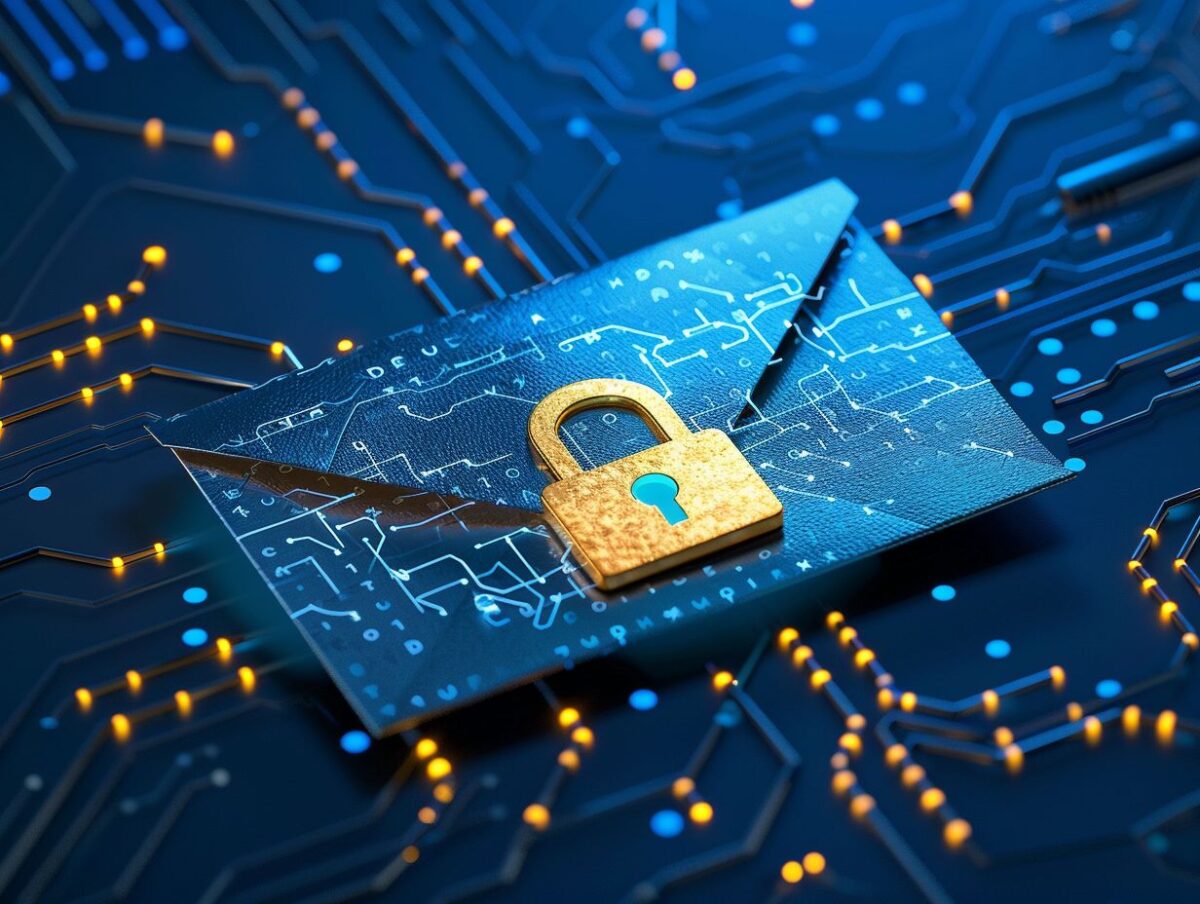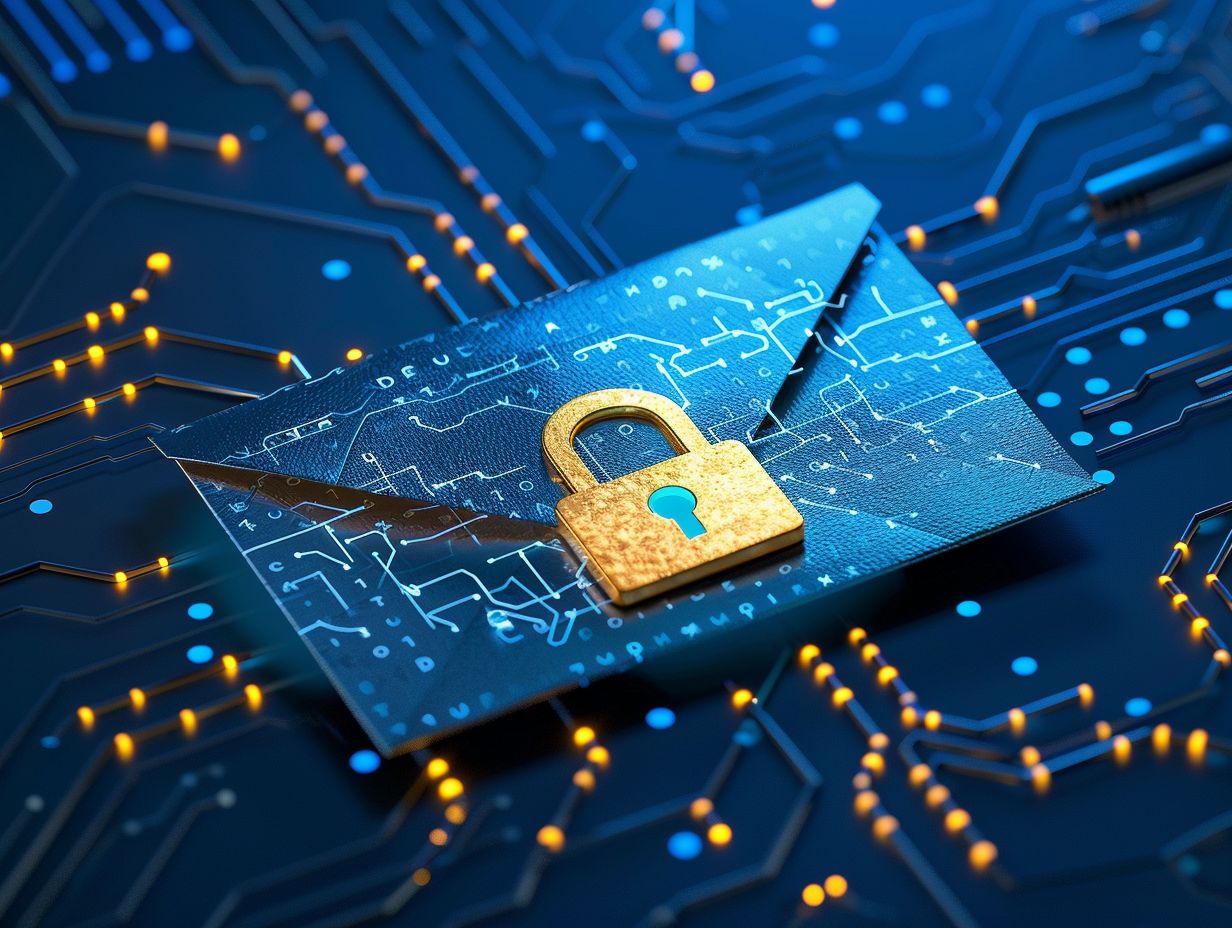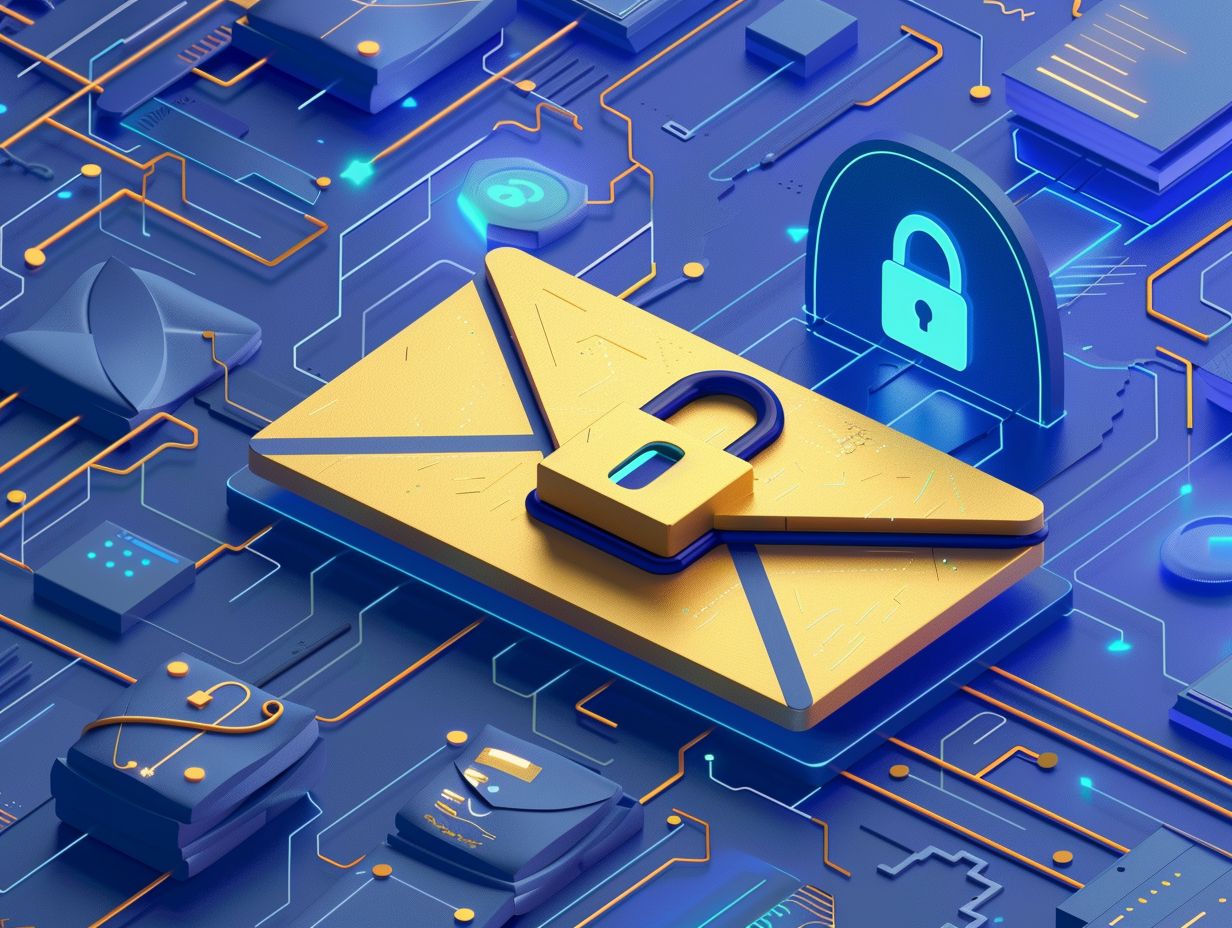Email Security Solutions Tailored To Business Needs

In today’s digital age, email security is paramount for businesses of all sizes. Unsecured emails can pose significant risks, impacting business operations and potentially exposing sensitive information.
It is important to explore the significance of email security for businesses, various types of email security solutions available, factors to consider when selecting the appropriate solution, and best practices for maintaining email security.
By understanding how to protect your business from cyber threats and ensuring the safety of your email communications, you can safeguard your sensitive information and maintain operational efficiency.
Key Takeaways:

The Importance of Email Security for Businesses
Ensuring email security is crucial for businesses to protect against the increasing risks posed by phishing, malware, and other cyber threats. Safeguarding sensitive data and guaranteeing secure email communication are vital components in securely maintaining business operations.
As technology evolves, cybercriminals also enhance their strategies by exploiting vulnerabilities in email systems to illicitly access valuable information. Phishing attacks, for example, frequently involve deceptive emails that imitate legitimate sources to deceive recipients into disclosing confidential data. Likewise, malware infections can quickly spread through email attachments, jeopardizing the entire network infrastructure.
By implementing robust email security measures, businesses can defend against these threats, thereby reducing the potential for financial losses, harm to reputation, and non-compliance with regulations.
Risks of Unsecured Emails
Unsecured emails pose significant risks to your business, leaving you vulnerable to phishing attacks, malware infections, and other cyber threats that could result in data breaches and financial losses. These risks may lead to compromised sensitive information, erosion of customer trust, and imposition of regulatory fines.
For instance, phishing attacks involve cybercriminals masquerading as legitimate entities to deceive individuals into divulging confidential data, which can then be used for identity theft or unauthorized access. On the other hand, malware infections can corrupt systems, pilfer data, or even render entire networks inoperable.
It is essential to implement robust email security measures, including encryption, strong authentication protocols, and employee training, to safeguard against these threats.
Impact on Business Operations
The impact of inadequate email security on your business operations can be severe, leading to data breaches, financial losses, and reputational damage. Effective protection against phishing attacks and malware is crucial for maintaining secure email systems.
A data breach resulting from insufficient email security can expose sensitive business and customer information, potentially leading to regulatory fines, legal implications, and erosion of customer trust. Financially, a breach can result in significant costs for investigating and resolving the incident, along with potential revenue loss due to reputational damage.
Reputational harm stemming from a security breach can tarnish your company’s image, affecting customer loyalty and overall business credibility. By safeguarding against phishing attacks and malware, you can take a proactive approach to prevent these adverse outcomes and ensure the smooth functioning of your business operations.
Types of Email Security Solutions
Various types of email security solutions exist to protect you against email-based threats, including encryption, anti-virus software, anti-malware tools, and spam filters. Each of these solutions plays a crucial role in safeguarding your email communication.
Encryption serves as a powerful method that scrambles the content of your email, rendering it unreadable to unauthorized parties. Anti-virus software functions by detecting and eliminating malicious software that could compromise your email systems. Anti-malware tools are designed to target specific types of malware that may infiltrate your emails, thus preventing potential damage. Spam filters help by blocking unsolicited and potentially dangerous emails, thereby reducing the risk of falling victim to phishing scams or other cyber threats.
By combining these different email security solutions, you can establish a robust defense against a wide array of online threats.
Encryption
Encryption is a critical component of email security, ensuring that sensitive information is protected during transmission. By encrypting email messages, you can prevent unauthorized access to confidential data.
This additional layer of security provided by encryption helps safeguard crucial details such as financial information, personal data, and business strategies. It acts as a shield against cyber threats like hacking, interception, and data breaches that could compromise the integrity and privacy of email communications.
Email encryption also contributes to ensuring that communication complies with various data protection regulations and industry standards, thereby maintaining trust and credibility with clients and partners. Email encryption plays a vital role in fortifying the defense mechanisms of organizations and individuals against cyber threats in the digital age.
Anti-virus and Anti-malware

Utilizing anti-virus and anti-malware solutions is essential for mitigating the risk of email-borne viruses and malware threats. These security tools help detect and remove malicious content from email messages.
By actively scanning your incoming and outgoing emails, these solutions can identify and block suspicious attachments, links, and scripts that may harbor harmful payloads. They employ advanced algorithms to recognize patterns and behaviors associated with known threats, providing real-time protection against evolving malware strains. Anti-virus and anti-malware programs offer regular updates to stay ahead of emerging security risks, ensuring that your email systems remain shielded from potential cyber attacks.
Spam Filters
You rely on spam filters for email security, as they are crucial in identifying and blocking unsolicited and potentially harmful email messages. Implementing strong spam filters is essential for your business to prevent unwanted emails and decrease the likelihood of falling prey to phishing attacks.
By utilizing advanced algorithms and machine learning techniques, spam filters can accurately evaluate incoming emails, distinguishing between legitimate communication and malicious attempts. This proactive approach not only protects sensitive information but also increases productivity by organizing inboxes. Effective spam filters strengthen data protection measures, ensuring that confidential information remains safe and shielded from cyber threats. Businesses that prioritize the incorporation of reliable spam filters demonstrate a dedication to maintaining the integrity of their communication channels and strengthening their overall cybersecurity stance.
Factors to Consider when Choosing Email Security Solutions
When selecting email security solutions, businesses like yours need to consider various factors to make an informed decision. Factors such as the size and type of your organization, the allocated budget for security measures, and the seamless integration of security solutions with your existing email systems are crucial aspects to evaluate.
The size of your organization is pivotal in determining the level of security required. Larger enterprises typically need more robust security measures to safeguard sensitive data and valuable assets. Conversely, small businesses may prioritize cost-effective solutions tailored to their specific needs.
Budget constraints are also a key consideration. It is essential to strike a balance between investing in comprehensive security measures and adhering to financial limitations. Ensuring the compatibility and smooth integration of chosen email security solutions with your existing systems is vital to prevent disruptions and guarantee optimal protection.
Size and Type of Business
When determining the most appropriate email security solutions, the size and type of your business are key factors to consider. Small and medium-sized businesses have distinct security requirements compared to large enterprises, necessitating customized solutions to address their specific needs.
For small businesses, cost-effective and user-friendly solutions that offer basic email encryption and malware detection may be adequate to fulfill their cybersecurity requirements. Medium-sized businesses often demand more advanced features such as threat intelligence, data loss prevention, and secure archiving to protect sensitive information effectively. On the other hand, large organizations with intricate networks and substantial data volumes require robust email security solutions that provide scalable encryption, advanced threat detection, and compliance management tools to defend against sophisticated cyber threats.
Budget and Cost
When evaluating email security solutions for your business, it is crucial to take budget considerations into account. You must strike a balance between the cost of implementing security measures and the level of protection needed to effectively safeguard your email networks.
One critical aspect you need to address is the efficient allocation of your budget to invest in robust email security technologies while ensuring that the selected solutions align with your specific security requirements. Conducting a thorough cost-benefit analysis is essential for determining the most cost-effective options without compromising the integrity and confidentiality of your email communications.
By strategically integrating budget considerations into your security planning, you can enhance your cyber resilience without exceeding financial limitations.
Integration with Existing Systems
Incorporating email security solutions seamlessly with your existing systems is essential for ensuring operational continuity and comprehensive protection. When selecting security solutions, organizations should carefully assess compatibility and integration capabilities to avoid disruptions to their email networks.
This integration plays a critical role in safeguarding sensitive information and preventing cyber threats from compromising data integrity. By opting for solutions that smoothly work together with their current email infrastructure, companies can effectively reduce the risk of phishing attacks, malware infiltration, and other cybersecurity breaches.
The ability of these solutions to function harmoniously within the organization’s network architecture enhances overall security posture and reduces the likelihood of email-related security incidents. Therefore, the choice of compatible and integrated email security solutions is crucial for organizations seeking to uphold robust data protection measures and sustain operational efficiency.
Implementing Email Security Solutions

When implementing email security solutions, a systematic approach is necessary to ensure thorough protection against cyber threats. By following a step-by-step guide, organizations can effectively deploy security measures to safeguard their email systems.
The initial critical step in the implementation process involves conducting a comprehensive assessment of the current email infrastructure to identify vulnerabilities and potential entry points for attackers. Once these weaknesses are identified, organizations can then proceed to select the most appropriate email security solution that aligns with their specific requirements.
Subsequently, it is crucial to carefully configure and customize the selected security measures to seamlessly work together with existing systems. Regular training and awareness programs for employees regarding best email security practices also play a pivotal role in strengthening defenses against phishing attempts and malware.
Continuously monitoring and updating these security measures is essential to proactively stay ahead of evolving cyber threats.
Step-by-Step Guide
- When implementing email security solutions, you should follow a step-by-step guide that includes assessing your security needs, selecting appropriate solutions, configuring settings, testing functionalities, and training your employees. By following a structured approach, organizations can streamline the implementation process.
It is crucial to conduct a comprehensive security assessment to identify potential vulnerabilities within your organization’s email system. This involves analyzing current security measures, identifying potential threats, and assessing the overall security posture.
After completing the assessment, you can proceed to select the most suitable email security solutions that align with your specific needs and budget constraints. Configuring the chosen solution involves setting up security protocols, encryption methods, spam filters, and access controls to ensure maximum protection.
Regular testing of the email security solution is essential to identify any weaknesses or vulnerabilities that may exist. Providing thorough employee training on email security best practices is paramount to ensure all staff members understand how to recognize and respond to potential security threats effectively.
Best Practices for Maintaining Email Security
Maintaining email security requires adherence to best practices, including regular updates of security tools, continuous monitoring of email networks, and thorough auditing of security measures. By following these practices, you can enhance your email security posture.
Regular updates of security tools are crucial to address vulnerabilities and ensure that systems are protected against the latest threats. Continuous monitoring helps detect any unusual activities or unauthorized access, allowing for timely intervention to prevent data breaches. Thorough auditing provides insights into the effectiveness of existing security measures and helps identify areas that require improvement.
Adhering to these practices is essential in the ever-evolving landscape of cyber threats to safeguard sensitive information and maintain the trust of customers and stakeholders.
Regular Updates and Training
Regularly updating security tools and providing ongoing training for your employees are essential for maintaining strong email security. You should prioritize continuous education and awareness to effectively mitigate evolving cyber threats.
By consistently updating security tools, you can stay ahead of cyber threats and ensure that your systems are prepared to handle the latest vulnerabilities and attack methods. Offering ongoing training for your employees will help them identify and address potential security risks in their daily tasks. This proactive approach not only strengthens your organization’s defenses but also cultivates a culture of vigilance and responsibility towards email security.
Integrating regular security audits and simulated phishing exercises allows your company to continually evaluate and enhance its email security posture. This equips employees with the knowledge and skills necessary to defend against malicious activities.
Monitoring and Auditing
Regular monitoring and auditing of email security measures is essential for detecting and addressing potential vulnerabilities and cyber threats. By maintaining a proactive approach to monitoring and auditing, you can enhance your organization’s resilience against email-based attacks.
This continuous vigilance allows your business to stay one step ahead of malicious actors who constantly seek to exploit email systems for their gain. By regularly assessing and fortifying your defense mechanisms, your company can create a robust shield against various cyber threats, such as phishing attempts and malware intrusions.
Through the meticulous examination of email traffic, your organization can swiftly identify any anomalies or suspicious activities, enabling you to take prompt action before significant damage occurs. Emphasizing a culture of constant monitoring and auditing not only safeguards sensitive information but also fosters a security-conscious environment within your organization.
Frequently Asked Questions
1. What are email security solutions tailored to business needs?

Email security solutions tailored to business needs are specific measures and technologies that are implemented to protect an organization’s email communication from potential cyber threats, such as viruses, phishing attacks, and spam. These solutions are customized to fit the unique requirements and security concerns of a business.
2. Why is it important for a business to have tailored email security solutions?
A business needs tailored email security solutions to ensure the confidentiality, integrity, and availability of their email communication. Without proper protection, sensitive information can be compromised, leading to financial losses, reputational damage, and legal consequences.
3. What are some common email security threats faced by businesses?
Some common email security threats faced by businesses include phishing attacks, malware, spam, and data breaches. These threats can compromise the security of an organization’s email communication, leading to the loss of sensitive information and financial damage.
4. How are email security solutions tailored to business needs different from generic solutions?
Email security solutions tailored to business needs are customized and specifically designed to meet the unique requirements of an organization. This means that they take into account the industry, size, and security concerns of a business, whereas generic solutions may not provide the same level of protection and cater to the individual needs of a business.
5. What are some examples of email security solutions tailored to business needs?
Some examples of email security solutions tailored to business needs include email encryption, data loss prevention, advanced threat protection, and email archiving. These solutions can be further customized based on the specific needs and concerns of a business.
6. How can a business determine the right email security solutions for their needs?
The best way for a business to determine the right email security solutions for their needs is to conduct a thorough security assessment. This will help identify the potential threats and vulnerabilities that exist within the organization’s email communication and allow for the implementation of tailored solutions that address these specific risks.









